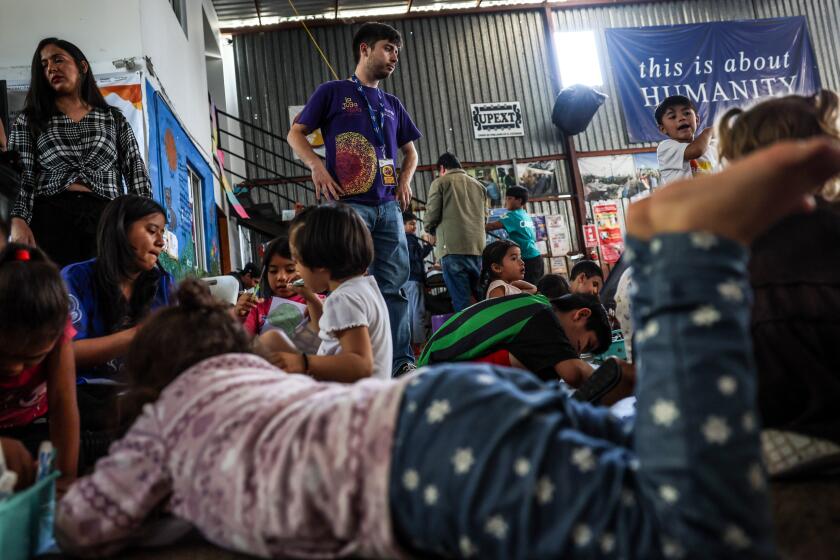Radio Offers Grim Drama on ‘El Norte’
Mexico’s newest radio drama begins with a scene of dozens of unemployed day laborers, standing on Lankershim Boulevard in the San Fernando Valley, drinking coffee and waiting for work.
When a man drives up looking for two workers, several run toward him and clamor for jobs. “Only two men, not 20!” the man shouts in heavily accented Spanish. “Out of my car or I’ll call the police!”
The new, 30-part radionovela, produced by the Mexican government, attempts to distill the hopes and hardships of Mexican immigrants living in California. The characters are poor and everyday people, not usually the stuff of mass-media fiction. They are undocumented workers, who often struggle with life in Los Angeles -- from a character who contracts HIV to another who goes days without a job.
The series was adapted from a novel written by Enrique Romero Moreno, a former protection officer at the Mexican Consulate in Los Angeles. Government officials said the radio drama is not designed to slow or stop Mexicans crossing the border, but to give immigrants an unvarnished view of the hardships of life in the north.
“People have visions that it’s a matter of taking the bus, crossing the border, finding a good job and sending money back home,” said Candido Morales, who heads President Vicente Fox’s new Institute for Mexicans Abroad. “But there are a lot of incidents that happen along the way. Some are positive and some are negative.”
Morales said the government wants to prepare Mexicans for the fact that life in the U.S. is not always glorious and that immigrants are not going to immediately become rich.
Laura Diaz de Leon of the government’s Ministry of Foreign Affairs was more blunt. “The American dream isn’t so much of a dream,” Diaz said. “The reality is the opposite.”
But Morales realizes that a radio series will not keep his countrymen south of the border. “The Mexican government has to stimulate the economy to create jobs in Mexico that pay well so people don’t have a need to go across the border,” he said.
The radio program is airing this month in Mexican states with large numbers of immigrants. Broadcasters are hoping to reach natives who haven’t made the trek across the border, as well as those who live in the U.S. but are home for Christmas.
Radio Bilingue, a public radio network based in Fresno, plans to bring the Spanish-language radionovela to California in January on stations that reach from the San Joaquin Valley to El Centro.
Based on Experiences
Romero said he simply told the stories of immigrants he met while working in Los Angeles. He named the novel “Hard Tortillas, not Even Enough for Beans,” a Mexican saying that means life is hard.
One expert on cross-border relations -- Konane Martinez, a visiting fellow at UC San Diego’s Center for Comparative Immigration Studies -- said she believes Mexico would never grow too aggressive with such cross-cultural critiques because its economy depends too much on immigrants and the money they send home.
Instead, Mexican political leaders are more intent on using such programming to show empathy for their compatriots abroad, many of whom are voters, Martinez said.
“For the government, this is all fairly new,” Martinez said. “There has been a movement lately, trying to show a little more support, especially health-wise, and trying to educate them on the dangers of crossing the border.”
Among the issues presented in “Hard Tortillas” are AIDS and drug abuse, with admonitions to use condoms, for instance. Workers injured on the job are also informed of their right to health care in the U.S. During the radio drama, the characters gradually learn the rights and responsibilities they have while living in America.
In one scene, a longtime day laborer urges some of the new workers to ask for at least $40 a day. But another responds that the dignity gained in demanding more pay won’t put food on the table. The laborers come across several patrones who refuse to pay fair wages, but they also meet generous employers who offer good pay, warm meals and beds for the night.
Another poignant tale is that of one Mexican family who prepare for their father to return for Christmas. They bathe in the river and wait outside their adobe home to greet him. But the holiday passes without any news. The man has died in Los Angeles, but his family is left in the dark because he carried no identification.
Romero said he believes his book and the radio program tell the story of every immigrant. “When someone is reading the book, they are reading about their cousin, their brother, their mother, their sister.”
The messages are as important for urban workers in Los Angeles as they are for rural employees in the Central Valley, said Radio Bilingue regional manager Guadalupe Carrasco. And serial drama is an ideal way to tell the story, Carrasco said, because it touches Mexicans close to their cultural roots.
First developed in Cuba in the 1930s, radionovelas brought families together to listen to the daily escapades of the soap opera stars. Serial radio dramas died out in the 1950s as they moved to TV and became prime-time telenovelas. But in recent years, radionovelas have made a comeback in Mexico, this time often with educational or health themes.
Johns Hopkins University has produced about 50 radio soap operas that have aired in Mexico and throughout the world, addressing such topics as family planning and communicable diseases. Professor Phyllis Piotrow, who founded the public health school’s Center for Communication Programs, said the dramas reach people who may not get the information any other way.
Surveys conducted by Piotrow’s center in several African and South American nations show that those who listen to such dramas are more likely to change their behavior than those who don’t. But the key is to make the soap opera truly gripping, she said, adding: “People love stories about other people.”
When Romero, 44, sat down one night and started jotting down his experiences from his days at the Los Angeles consulate, he had no idea his message would eventually be heard by so many people on both sides of the border.
Born in Michoacan, Mexico, Romero was 11 when his family moved legally to the San Fernando Valley. Romero received a bachelor’s degree in international relations in Mexico and began a career with the Mexican Consulate as a volunteer.
“I felt like Superman when they offered me a job,” said Romero, who now works at the Mexican Consulate in northern Guatemala. “I thought I was going to solve all the problems. But they never end. I felt powerless.”
Common Characters
Romero said writing the book helped him release his frustrations about the lives of the immigrants, many stuck in low-wage jobs with little chance of moving up. Each of his characters is a prototype of dozens more, he said. There’s Tururu, a college graduate; Coras, who is always begging for quarters, and Yes Yes, who knows just one English word.
Romero wrote an hour each day until he had 479 pages, then published the paperback himself. Hoping to get a raise from the consulate, he sent one of the 2,000 copies to his office headquarters.
“The dreams, illusions and ambitions already are things of the past,” he wrote in the opening paragraph of “Hard Tortillas.” “Today it is an uncertain path, they do not know where they are going to end up.”
Production of “Hard Tortillas” began last January, when Olga Duron, a producer with Radio Educacion, traveled to Los Angeles with Romero to visit the sites mentioned in the book. They recorded sounds at bars, soccer fields, jails, churches and hospitals. “We couldn’t reproduce something we hadn’t seen,” said Duron, noting that Spanglish was especially hard to replicate.
In re-creating scenes from the book, Duron said she tried to remain faithful to the nostalgia many Mexican workers living in the U.S. feel for home.
Each episode begins with the chorus of a song by the popular group, Los Tigres del Norte: “Like an eagle in flight ... I have spent my life exploring other lands to give my children a better tomorrow.”
Romero, who is married and has three children, said the voices in the radionovela sound just as he had imagined. He has already started a second book, “Esta es la Tostada.”
Romero said that he feels a strong bond with all Mexicans who have spent time in the U.S., no matter their legal status.
“It’s not whether you have papers or a green card or U.S. citizenship,” he said. “We come from the same place.”
More to Read
More to Read
More to Read
Start your day right
Sign up for Essential California for news, features and recommendations from the L.A. Times and beyond in your inbox six days a week.
You may occasionally receive promotional content from the Los Angeles Times.






